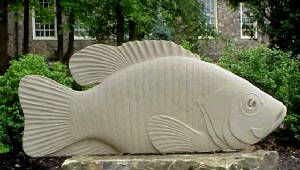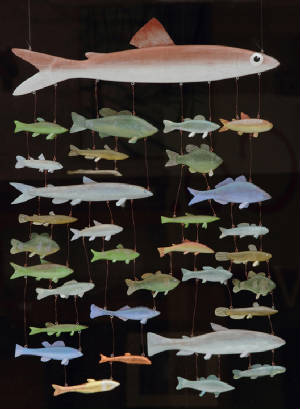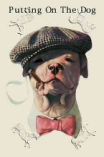|

|
| Crock Bass by Tom Rudd |
The
Morality of Thomas Jefferson
by Lynette Eklund
Pop is named after Thomas Jefferson, but I think
that’s where the similarity ends. Pop isn’t nearly so smart. He didn’t finish elementary school and he’s
probably never read the Declaration of Independence. We don’t live in a big house and we don’t have servants—well,
I don’t anyway. Pop has me.
I have to clean the house and work in the store
ever since Ma died.
Pop’s store isn’t much of a place to
anyone beyond the locals, but it serves its purpose well enough. It sits close to the road, right atop the hill’s crest,
where plenty of cars driving by and everyone in the valley can see its new, pretty red metal roof. He’s awful proud
of that roof… Put it on all by himself just last spring. A real eye-catcher,
it is.
“Come on, Bess,” he says to me.
I’m always five steps behind him wherever
we go. It isn’t that I don’t want to walk with him, because I do. I just can’t keep up with those long legs
of his.
“Quit picking those darn weeds. We have to
be open in …” He hooks his thumb on the chain that disappears into his pocket and yanks his pocket watch out with
one efficient jerk, “… seven minutes.” He picks up his pace, not by moving his legs faster, but by taking
even longer strides.
Thomas Jefferson’s Declaration of Independence
says: We hold these truths to be self-evident, that all men are created equal... I’m
here to tell you, it is self-evident that we are not. If we were, my legs would be much longer. I tuck the bouquet of blue
and white wildflowers in the pocket of my smock and break to a trot—and almost catch up.
By the time we reach the store’s porch,
we’re sweating like we’ve been working in the sun all morning. It’s going to be another hot one. It hasn’t
rained in more than two weeks, but the river and thick trees keep the air so heavy, even the birds are quiet. The only noisy
critters are the frogs calling to Pop to go fishing, but Pop acts like he doesn’t hear the call—as usual —and
shoves the skeleton key into the keyhole.
There’s a heavy thunk of the lock disengaging. He gives an approving nod and pushes the door open wide, letting the sunbeam streak
the width of the store to spotlight the shiny copper-bottom pans that arrived three days prior. Pop had to move a whole shelf
of tools to open enough space for them, but it was worth it. Their gleam makes the whole store feel fancy.
I grab the vase from beside the cash register and
hurry to the pump out back to get fresh water for the flowers. I figure I have about thirty seconds before Pop notices I’m
not sweeping.
Sure enough. I barely get the vase back into place
when I hear him say, “The morning’s a-wasting. We’d better get the dirt off the steps,” and then he
goes on out ahead of me.
But he doesn’t sweep. He just stands there
staring at air, with his shoulders back and his spine so straight you could check boards for warps against it. When he gets
like that, I know he’s thinking of Ma.
Everyone misses her. I don’t know why she
died exactly. Some say it was because of her diabetes, but I don’t know for sure. I wasn’t there. Pop was right
there holding her hand, but he’s not talking about it.
Finally, he shifts his sight toward the north—so
I do, too.
The top of a gray head tips from side to side almost
more than it bobs up and down. Ol’ Jack is coming.
…that
they are endowed by their Creator with certain unalienable Rights. Pop is the only person who seems to know that, where
Ol’ Jack is concerned—even if he hasn’t read the Declaration of Independence. He waits until he is sure
it’s Ol’ Jack, and then he hurries back inside and does an odd thing. He starts stirring in the icebox behind
the counter.
We just cleaned it yesterday and there’s nothing
in there but about a dozen eggs, a couple pounds of butter and four quarts of milk, so there’s nothing he could be doing
in there, except maybe cooling off a little—and he always tells me not to be wasteful whenever I stand the door open
for more than a few seconds.
As Jack approaches me, he shifts his basket to the
crook of one arm and tips his invisible hat, “Good morning, Bess. You’re always a pleasure to see,” and
then he limps on inside.
Jack is setting his basket on the counter when I
go back in. He pulls back the frayed cotton towel and holds up an egg. “I got twenty-seven of ‘em. I only got
a little cash, so I’m hopin’ you need eggs.”
“That’ll be just dandy, Jack,”
Pop says. “I just looked when I seen you coming. We’re down to our last half-dozen.” Pop seems to be handling
those eggs as if they were made of blown glass. Eggs are fragile, but not that fragile. “You just get what you need
and we’ll settle up when you’re ready.”
Jack works his way through the tables, gathering
the smallest quantities of salt, sugar, coffee and corn meal available and brings them to the front. “Do I have enough?”
…and
accordingly all experience hath shewn that mankind are more disposed to suffer...
Pop picks up a small pad of paper and a pencil so
sharp he could stab a flea on a dog without touching its hair and starts working out his calculations. He makes a big deal
out of it and makes Jack wait so long the old man begins to fidget. “Well,” he says at last, giving the page one
last tap with the tip of his pencil. “The way I got it figured, you still have ten cents left.”
…that
among these are Life, Liberty and the pursuit of Happiness.
Jack dumps the little bit of change he has onto
the counter and waits while Pop counts it, scoots two nickels back over and loads the basket with the groceries.
After the old man leaves, Pop disappears with a
bucket and leaves me to assist Mrs. Abney, who has just stopped in for some lace to finish the dress she is making.
As I’m working out the transaction, Mrs. Abney
asks to add nine eggs to it. “I’m taking an angel food cake to the church social, you know.”
I know. Everybody knows. Mrs. Abney always takes
angel food cake to the church socials. I open the icebox, count out her nine eggs, and put the remaining ten back.
Mrs. Abney barely gets out back on the road in her
pretty, yellow De Soto before I run after Pop.
I don’t go far to find him, nor do I want
to stay once I do.
He’s out back shoveling dirt in a hole, and
the entire area reeks of sulfur and, with so little breeze stirring, the stink isn’t going to go away any time soon.
Pop props his foot on a nearby crate and wipes some
egg goo from his cuff.
He looks up and sees me watching him. “What’re
you looking at, little girl?”
…
Prudence, indeed, will dictate that Governments long established should not be changed for light and transient causes …
I spin on my heels and hurry back inside, picking
up a feather duster and going to work on the cereal display.
When Pop comes back in, he goes right to straightening
the canned goods, making sure every label faces out and every can is neatly aligned, without saying a word.
…we
mutually pledge to each other our Lives, our Fortunes, and our sacred Honor.
Pop is Thomas Jefferson. He’s smart.
Lynette Eklund is an upmarket author and senior editor
at Allegory eZine. In her day job, she’s a free-lance creature-effects artist
for film and theater, where her efforts contributed to the Oscar-nominated Raptors
for Lost World and the Emmy-award winning corpses for The Stand. At present,
she’s building creatures for a new ‘webisode’ series and breaking down the script for a prospective film
project while writing her next novel.

|
| Clake Superior Fish Curtain by Tom Rudd |
A
Drink with the General
by
Daniel Davis
Nathan Ellerbe awoke to find General Robert
E. Lee sitting beside his bed. The General's face was downcast, but there was no denying the Confederate gray of his suit
and beard. He seemed smaller than Ellerbe had always imagined, shrunken. Perhaps it was the way his back was bowed, as though
he were in the process of falling asleep. Perhaps it was the stench of whiskey that emanated from the large metallic flask
Lee held in his lap.
"Sir?" Ellerbe said, but his voice was barely whisper
in the darkness of his hospital room. His "death room," as he called it to himself, and fancied his children called it as
well.
The General looked up. Even in the soft glow of
the nightlight and various electronic equipment that dotted the room, Lee's eyes were a piercing blue. As light as the sky
over a Virginia summer day, and just as deep.
"Corporal," Lee said. "I apologize if I have awoken
you."
Ellerbe had never served in the military—a
club foot had seen to that. But he didn't contradict the General. Instead, he
said, "Are you all right, sir?"
"For a man who has been dead over a century, I suppose
I am in good enough shape.” The General coughed and took a drink. "Want some, Corporal?"
"Thank
you, sir, but I shouldn't. A man my age..."
"You're
a whelp still, Corporal. Here.” He emptied Ellerbe's water glass onto the floor and poured two fingers of whiskey into
it. "Drink up. To our health."
Ellerbe drank. He hadn't had whiskey in a decade
at least. It burned his throat, and tears came to his eyes, but he bit back the coughing fit that threatened to overcome him.
Not in front of the General.
"You are lucky to have a single room," Lee said.
"You don't have to fight over control of the television."
"I don't watch it much," Ellerbe told him. "There's
nothing on but bad news these days."
"There has always been bad news, Corporal. There
will always be bad news. More bad than good, sometimes. Maybe most times."
He spoke like one who would know from experience,
so Ellerbe just nodded his head. Couldn't contradict it. Try being raised a black man in the rural south. Try fighting well-meaning
men who still viewed you as somehow lesser. Good intentions could hurt worse than bad sometimes. But that wasn't news. That
was reality.
Lee pulled out a cigarette and a Bic lighter.
He lit the cigarette carefully, his fingers unsteady, as though he were still getting used to handling the lighter.
"Actually,
Corporal, I am here to deliver some bad news."
Ellerbe nodded. He'd suspected as much. His
mother, God rest her, had believed in signs and portents. Ellerbe never had, but as he'd aged, he'd at least come to accept
the possibility that he didn't know as much as he thought he did. Time prepares you for most things, and you develop a sort
of intuition that you never fully understand. Or at least Ellerbe had.
Lee took a deep drag, but was conscientious enough
to blow the smoke away from Ellerbe's bed.
"I have done this more times than I can count,"
the General said, "There is a routine I follow—these very words, in fact—but that doesn't mean it ever becomes
easier. A commander takes on certain responsibilities—not just the lives of his men, but their afterlives as well. It
is my duty to see to it that they are cared for during and after their death. Drink your whiskey, Corporal. It will help."
Ellerbe followed the order, though the whiskey didn't
help much at all. This time, he couldn't help but let a little gasp slip free. Lee pretended not to notice.
"You may think a man's death may mean many things,
depending on the man, but really it means only one thing: inevitability. Whether you believe it is the end, or a new beginning,
it is still inevitable. It will happen. Sometimes, I wish they taught us that on our first day as school boys: I am Mrs. Atwood,
and you and your loved ones will die some day. At least we would then begin the process of accepting it. Our pain would be
dispersed over the intervening years, and at the crucial moment, we may reach some sort of relief: It has finally come.”
Another drag. "Yes, that would be ideal, would it not?"
Ellerbe nodded. He said, carefully, "I see."
Lee didn't seem to hear him. "Of all the ways a
man can die, perhaps old age is the greatest. It means we survived. Of course, no man simply dies from age—he dies from
age-related circumstances. I myself suffered a stroke. I could not even utter my last words. But there is dignity in that.
Perhaps, had I spoken, I would have said something below my standing. God forbid.” He gave a brief, harsh laugh. "I
have seen many men that I cared for die. I have sat at many deathbeds, and seen grief in all of its stages. Such is the burden
of a commander."
He reached out, almost without thought, and placed
a hand on Ellerbe's bed. His fingers were covered in coarse gray hair, his knuckles
and nails stained with tobacco. It was an old man's hand, much like Ellerbe's own.
"Death must be accepted. Surely a man of your experience
can understand, Corporal. To deny death is to leap in front of a train and insist you can stop it through sheer will. You
cannot."
"I
know," Ellerbe croaked. He was surprised at how hard the words were to speak.
"Good.” The General pulled the cigarette from
his lips and looked carefully at the smoldering tip. Then he crushed it with his fingers and flicked it into the waste bin.
"I regret to inform you, Corporal, that your brother
has fallen in combat. His death was instantaneous; he felt no pain."
The General stood and met Ellerbe's eyes for the
first time. The contact was brief and unpleasant. "I will leave you to grieve, Corporal. Take heed: God's will is complex
and sometimes cruel, but it is always for the better."
Ellerbe opened his mouth to say that he had no brother,
but his throat was constricted; no words or breath could escape. He closed his eyes as a wave of nausea swept over him; when
he opened them again, he was alone in the room. All that remained was a puddle of water on the floor, a half-swallow of whiskey
in the bottom of his glass, and the lingering aroma of filtered Marlboro Lights.
Daniel Davis, an editor for The Prompt Literary Magazine, was born and raised in Central Illinois.
His work has appeared in various online and print journals.
|

